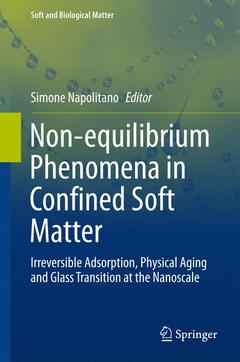Non-equilibrium Phenomena in Confined Soft Matter, Softcover reprint of the original 1st ed. 2015 Irreversible Adsorption, Physical Aging and Glass Transition at the Nanoscale Soft and Biological Matter Series
Coordonnateur : Napolitano Simone

Presents the state of the art on the phenomena of nano-confinement for a large class of polymers and low molecular weight glass formers
Shows how confinement effects are related to non-equilibrium phases
Collects the latest and most important experiments and simulations on nanoconfined systems
Features contributions from some of the most active and respected researchers in the field
Includes supplementary material: sn.pub/extras
Date de parution : 09-2015
Ouvrage de 300 p.
15.5x23.5 cm
Disponible chez l'éditeur (délai d'approvisionnement : 15 jours).
Prix indicatif 105,49 €
Ajouter au panierDate de parution : 10-2016
Ouvrage de 300 p.
15.5x23.5 cm
Disponible chez l'éditeur (délai d'approvisionnement : 15 jours).
Prix indicatif 105,49 €
Ajouter au panierThème de Non-equilibrium Phenomena in Confined Soft Matter :
Mots-clés :
Broadband Dielectric Spectroscopy; Chain Confiment in Ultrathin Films; Characterization of Confinement Effects; Confined Glass-Forming Liquids; Irreversible Chain Adsorption; Irreversibly Adsorbed Polymer Layers; Molecular Dynamics in Confinement; Nanoscopic Confinement; Out-of-equilibrium Glass Dynamics; Physical Aging of Polymer Glasses; Polymers under Confinement; Surface Dynamics of Thin Polymer Films



